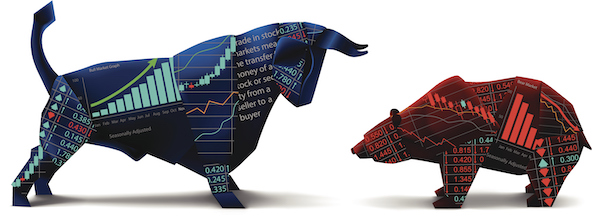SPECIAL BULLETIN
The stock market is always ripe for drama. Last week, the Dow Jones Industrial Average* dropped 127 points on Monday. It sank 500 points early on Tuesday, due to some companies reporting gloomy results, but closed the day down only 126 points.
“The market is fragile,” an investment manager told CNN. “But we’re telling our investors to relax.”
Relax? On Wednesday, the Dow dropped again. This time it was shear panic. It plunged 606 points, a 2.4 percent decline sending the Dow into losing territory for the year, MarketWatch said.
The Dow rose 1.6 percent on Thursday. On Friday, it was down 1.2 percent.
Is this the start of a major stock market correction or just a bad, bad week? No one knows. And, while I suspect the market isn’t done riding this Bull, what we know for sure is that a stock market correction will happen at some point.
240% growth by staying the course
What should you do about the stock market’s current volatility?
Don’t do anything emotional. Stick to your investment plan.
This is not 2008. The economy and stock markets are fundamentally much healthier today. That said, you know the stock market doesn’t keep on rising — and you wouldn’t want it to go up irrationally anyway. That would lead to severely unstable stock overvaluations.
Instead, we’d like to see stock prices match the underlying fundamentals of the respective companies.
Right now, the U.S. economy is strong. There are jobs. Unemployment is low, and corporate earnings are largely better than expected. True, interest rates are on the rise, the U.S. is fighting some trade wars and, thus, some investors are trading in and out of stocks. Volatility has been the result.
But, we’ve been through tough markets before and have come out just fine.
Let’s look at some facts …
The Dow hit a high on October 9, 2007, when it closed at 14,164.43. A global financial crisis ensued. Investors sold holdings. The Dow fell by more than 50 percent to a low of 6,594.44 on March 5, 2009.
The drop was not the largest in history; the Great Depression saw worse. Yet, the 2007-2009 markets brought on large-scale panic. Many individuals stopped contributing to their qualified IRAs and 401(k)s. They paid a hefty price for doing so.
Fidelity Investments has studied the 2007–2009 financial crisis in-depth. Fidelity compared more than 1.4 million retirement plan savers and found that very often investors become their own worst enemy. They let emotion override sound investment planning.
On average, Fidelity says, savers who stuck with stocks in 2008 and beyond saw their account balances grow about 240 percent. That was about 50 percent more than investors who bailed out of stocks in 2008 or the beginning of 2009.
Those who stayed the course, Fidelity says, endured as their average account balance of $115,000 in June 2007 dropped to $85,000 at the start of 2009. But 10 years later, the market recovery and continued savings drove that average balance up to $315,000.
By staying the course, some investors experienced the tripling of their wealth.
You are more broadly diversified than the Dow
The Dow is not a diversified portfolio of stocks — it’s a group of 30 large U.S. companies. The universe of stocks available to purchase is something like 17,000. So, when you hear of the Dow plunging on any given day, it may not reflect at all what’s happening in your portfolio.
Of course, the past is no predictor of the future, especially in stock market investing. But, here are three take-away points …
- Watch out for your emotions. They can get in the way of your investment goals.
- Don’t try to time the markets. It can’t be done in any meaningful way.
- Remain invested through stock market cycles.
Seven years ago, Larry Bakerjian wrote …
“What’s most effective, in my opinion, is to develop an allocation that suits your situation, your objectives and your risk tolerance, and then not to let short-term bits of market news or performance sway you. Times will come when you need to react, but generally speaking short term reactions often cost you in the longer run.”
Today, I’d like you to think about this …
This market requires caution and not necessarily any action.
You may want to reassess your portfolio allocations, but first ask yourself what has changed. Is the change emotional, driven by fear of loss in an unstable market? Or, has your situation and objectives changed. In either case, I’m here for you. Please call or email if you would like to discuss the market or your portfolio.
I understand the stock market is not fun right now. Try to remember what Larry and I have said before …
“While the events of the past several weeks may have been unnerving, stock market volatility is not a concern for us. We’ve seen the stock market behave like this before.”
Is the stock market heading for a big tumble? We don’t know if this is the start of a bigger correction, but we know a correction will happen at some point. You’ll want to have a smart investment plan. Stick to it.
* The Dow Jones Industrial Average (the Dow) is a price-weighted index of 30 actively traded blue-chip stocks. Indexes are unmanaged and cannot be invested into directly.


